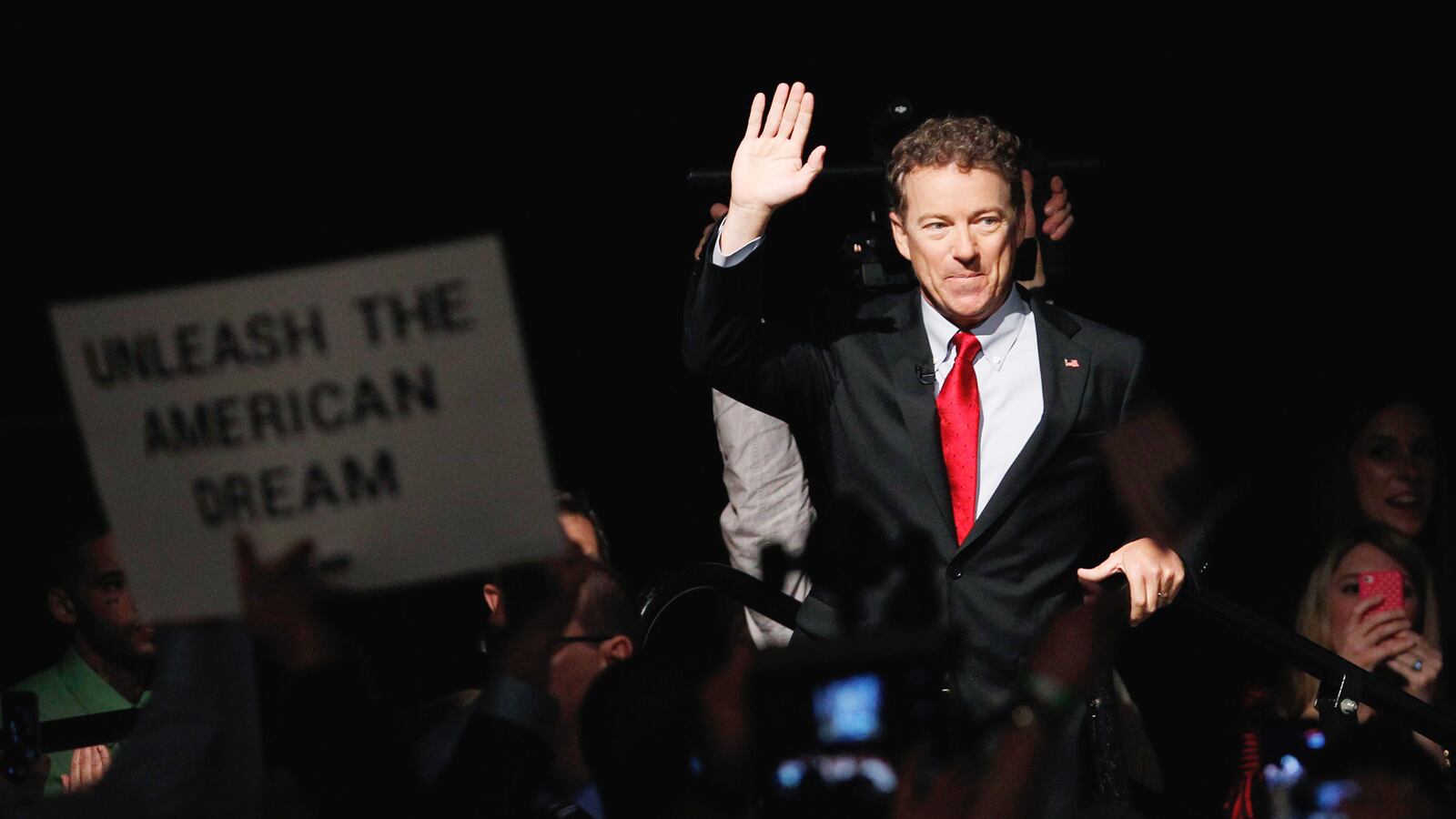From the tacky ballroom of the Galt House Hotel in Louisville, Rand Paul announced on Tuesday what anyone even vaguely aware of his existence has known since he entered the Senate in 2010: He is running for president.
The marketing of this campaign is that Paul is a “different” type of Republican, and a “different” sort of politician altogether.
His slogan: “Defeat the Washington machine/unleash the American Dream.”
“Too often when Republicans have won we have squandered our victory by becoming part of the Washington machine,” he said. “That’s not who I am.”
It wasn’t exactly clear what Paul meant by “Washington machine.”
Paul has never been involved in any form of government besides the federal government.
He vaulted from eye doctor to the Senate in 2010 because his father was a well-known, libertarian congressman.
Does he want to do away with the very demented system that made him?
Or maybe by “Washington machine” Paul means the system whereby actual governing is an afterthought to politicking.
Paul dislikes this culture so much that ahead of his speech, he aired a hype video featuring half a dozen cable pundits including former House Speaker Newt Gingrich and MSNBC host Chris Matthews praising him, as if those voices should be considered an authority in America.
Paul detests the “Washington machine” or, in other words, the system that has permitted him to spend almost the entirety of his first term in office preparing and running for the Republican nomination.
Whatever the Washington machine technically is, the overarching theme of his speech was that he is the only living human being running for president who is capable of curing its dysfunction.
But he is also not, perplexingly, certain that it can be fixed at all.
“Washington is horribly broken. I fear it can’t be fixed from within,” he said, while attempting to make the case that he can lead the country to a better tomorrow. If Reagan was a happy warrior, Paul is a confused one.
“I have been to Washington, and let me tell you, there is no monopoly on knowledge there,” he smirked.
According to Paul’s FEC filing, the anti-Washington campaign’s official P.O. Box is in Washington.
Paul’s “I’m new and different” message wasn’t only undercut by the content of his speech and the reality of his political career and the location of his campaign, but by the venue and the production of the announcement itself.
He was introduced by a cast of characters including: pastors, a local doctor, a state lawmaker, and his wife, Kelley Paul, who was basically there to make the case (rather convincingly, to her credit!) that Paul is a good, trustworthy guy.
A blind little girl was cynically trotted out onstage to deliver a rendition of the National Anthem.
A seemingly never ending series of videos played before Paul took to the lectern, making the whole charade seem a bit like a one-man CPAC.
The crowded, dark room where Paul delivered his remarks felt like a small place to make such a large declaration about his future and the future of the country. It seemed more fitting for a school talent show or a sad business retreat than the launch of a presidential campaign.
“Some people asked me, ‘Why are you running?’” Paul said. “The answer is the same now as it was then. I have a vision for America.”
The crowd of 1,000 was mostly subdued, though they clapped and hooted in all the right places and even broke into a chant of “PRESIDENT PAUL!”
There were no surprises in Paul’s speech.
He was, as always, a grab-bag semi-libertarian, intensely skeptical of foreign intervention while possessing a burning desire to fight “radical Islam.”
He touted his belief in lower taxes and “economic freedom zones” that would stimulate failing cities. He advocated criminal justice reform, which is, conveniently, a siren for African-American voters.
On his first day in the White House, he said, he would end NSA surveillance.
By 3 p.m., Paul had already sent out a fundraising email.
Now that he is officially a candidate, he wrote, “the media, pundits, and the elites will immediately jump all over how well we do out of the gate. They’ll want to know how many people got on board.”
“Will you contribute $25, $50, $100, $250, $1,000, or even the maximum $2,700?”
And he started hawking Stand with Rand Swag: “Rand on a Stick (Set of 12)” ($35), a Rand Paul birthday card ($35), and Rand Paul sandals ($20).
If Day One is any indication, the only thing different about this campaign is its complete lack of self-awareness.





